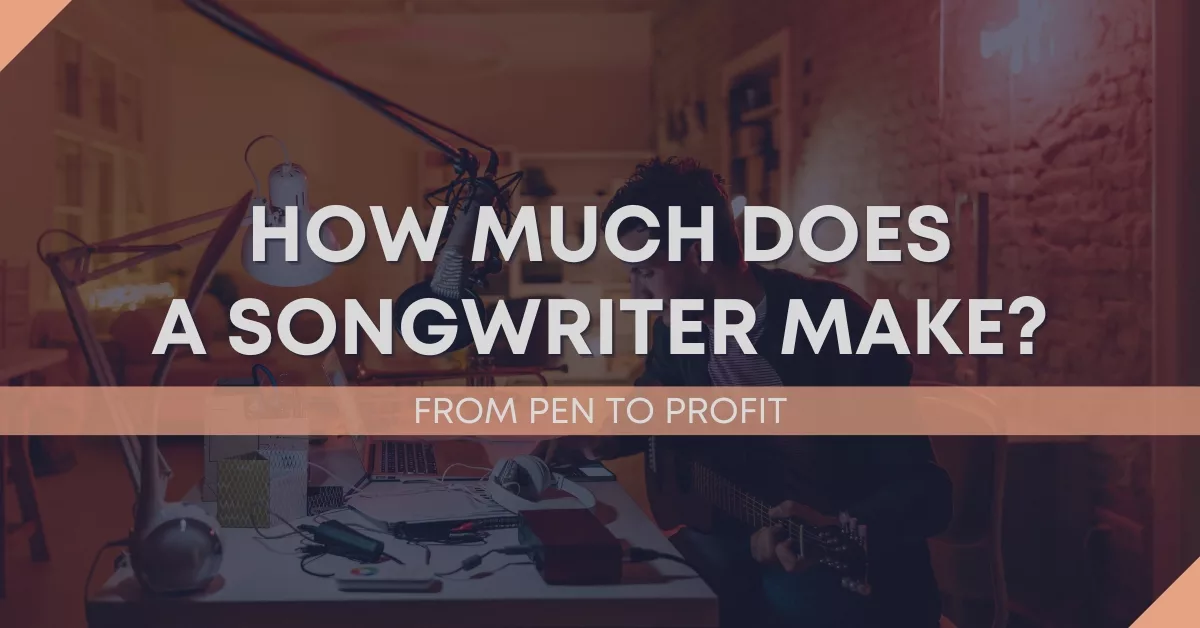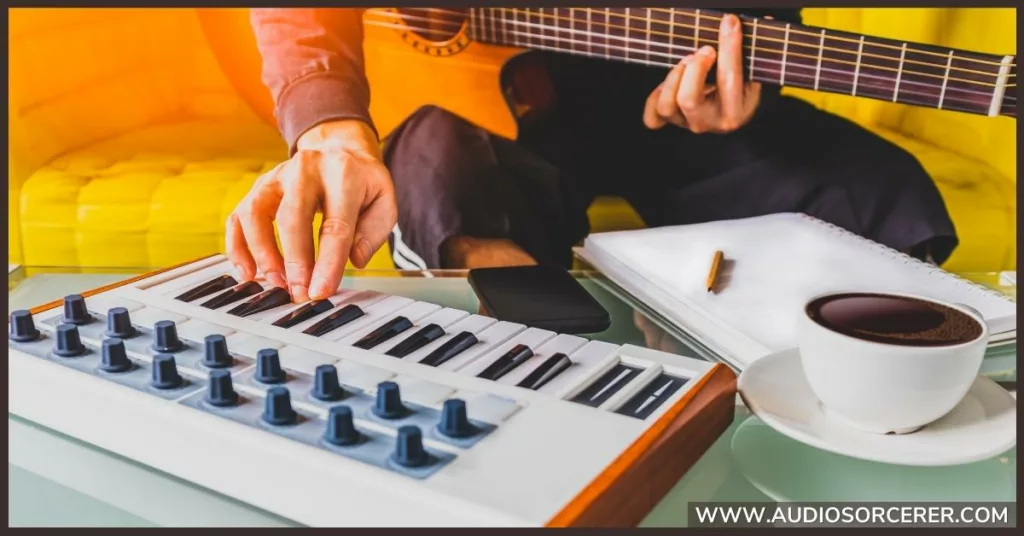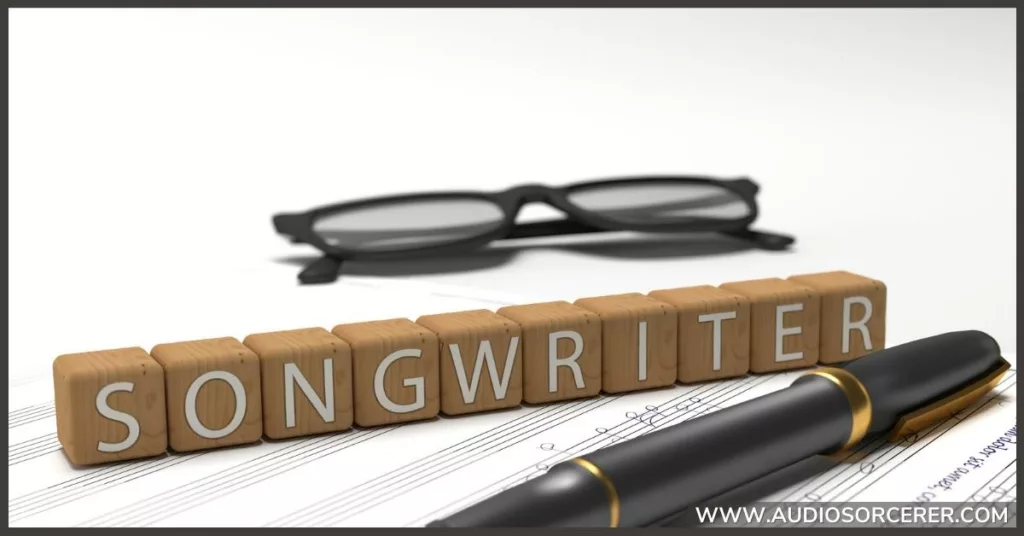
A songwriting career can be a perfect fit for people who can craft catchy melodies and write compelling lyrics, but does it pay well?
The average annual pay can range between an impressive six-figure salary and a mere $11,000.
So, how much does a songwriter make, how do they get paid, and why is there such a huge gap in the income estimations? That’s what this post is all about!
In the music industry, “songwriting” is a bit of a catch-all term. A songwriter could, technically, be a composer, a lyricist, or both.
In fact, some people chop the term into even more roles, including topliners and beatmakers. So a songwriter’s job description could cover anything from creating melodies and picking chord progression to writing the lyrics itself.
Of course, a songwriter could also be a singer or a co-publisher. Yet, in many cases, they collaborate with others in the industry to record, produce, and distribute their music.

Like many other creators in the music industry, songwriters rely on reproduction, performance, and streaming royalties for the majority of their income.
However, other lucrative opportunities might be available if the song is catchy enough to make it to movies and commercials.
Here’s how writers get paid by publishers, performing rights societies, printers, and visual media producers:
Songwriters and publishers get a slice of the cake for every CD, Vinyl, and permanent download sold, but the payment isn’t as large as you might think.
For the longest while, the rate was 9.1 cents per sale, split evenly between the publisher and the songwriter.
However, there was a recent proposal to push the rate to 12 cents, known as “Settlement 2.” It’s also worth noting that this was the only increase to be approved by the Copyright Royalty Board (CRB) in over 10 years!
Every time a song is played in a public setting, the creators become entitled to a performance royalty. Think sports events, restaurants, and stores.
While this is a key income source for songwriters, it doesn’t follow a standard rate.
Instead, the venue owner licenses the song from a PRO (Performance Rights Organization). Naturally, the fee will change depending on how large the venue is and how often they license music.
After collecting the payment, the PRO pays the creators. In a typical situation, the songwriter and the publisher get 50% each.
Note that the creators have to be part of the PRO society in the first place. The top options in the US are ASCAP, SESAC (invite-only), and BMI.
So, US-based songwriters and publishers get a total of $0.091 (or $0.12) for each physical sale, but not everyone buys CDs and LPs nowadays. That’s why mechanical royalties include digital downloads and streaming.
Usually, digital mechanical royalties follow the same rate as physical ones. However, things get a little dicey with streaming services.
The royalty is calculated as 10.5% of the platforms’ gross revenue minus the costs of public performance. So the payment is going to change between platforms, but you can expect it to be around $0.005 per stream.
Related Article: How Much Does Spotify Pay Per Stream? Is The Payout Fair?
Performance royalties don’t cut it when a song is used for a movie or a commercial—that’s where synchronization (sync) fees come in handy.
Sync deals are paid whenever a song is “synched” to other visual media. They’re usually a one-time up-front payment, and songwriters/composition owners get a share of the payment.
Sync fees are often between $15,000 and $60,000 (split among shareholders). That said, the deals for hit songs can be lucrative and open to negotiation. For instance, it cost a whopping $500,000 to put AC/DC’s Thunderstruck in the 1999 movie Varsity Blues!
At the end of the list, we have the print music sheet sales. While songwriters/composers get their share (often a split with publishers), it isn’t a common type of royalty.
Those are paid by printers in exchange for the right to distribute copies of the copyrighted material (the music sheet).
On average, the print royalty for a single-song sheet music hovers around 20% of the retail price. Meanwhile, collections stand at 10–12% of the retail price.

From market trends to the nitty-gritty details of the contract, there are a lot of variables in the songwriter’s money-making equation.
Let’s take a closer look at the top five factors at play:
The average earning in the music industry as a whole is largely dependent on fame.
Don’t just take our word for it; go back to the gap between the average sync deal and what people were willing to pay to license AC/DC’s hit song for a movie.
Unlike traditional salaried jobs, songwriting is all about the volume and success of the composer/lyricist’s work. However, not all people can turn ready-to-record songs at the same rate.
People who are new to the game are sometimes advised to write around 40–50 songs in a year, but it’s reasonable to assume that only ten or so will be good enough.
Meanwhile, industry legends like Bob Dylan can write more than 500 songs throughout their career.
Since demand and popularity play a huge role in track sales, some genres have higher money-making chances. For one, a report by Forbes tracked the distribution of earnings among top musicians from 2012 to 2016 and found that pop is a steadily rising genre.
Even within streaming platforms, some genres are considered under-represented.
In 2019, What Hi-Fi reported that although classical music makes up 5% of the industry’s output, it only takes up a tiny (0.5%) part of the net streaming revenue.
Since classical tracks tend to be long, they don’t fit as well as three-minute hit pop songs into the typical streaming platform’s pay-out model.
Not all songwriter-publisher agreements are the same.
The common option is the individual song and exclusive agreement, where the writer transfers the copyright to the publisher. Then, they receive “advances” that are later deducted from their share of the royalties.
However, some songwriters opt for co-publishing arrangements. In this case, they co-own the copyrights, and their share of the royalties jumps to 75% (the usual writer’s share plus half of the publisher’s cut).
Participation agreements are like co-publishing models when it comes to the royalty division, but they don’t give the songwriter copyright ownership.
In 2017, Music Week found that writing a hit song (think Top 100 lists) is hardly a one-person job. Instead, you need an average of 4.53 songwriters to top the charts.
Here’s the catch: Royalties don’t double just because a song has more than one writer.
So, if a song sale generated $0.091 in mechanical royalties, the publisher and the songwriter get $0.045 each. But if four people co-wrote the track, they’ll split the $0.045 four-ways between them.
Meanwhile, writers who take on multiple roles receive higher cuts. Take, for instance, singer-songwriters or solo songwriters.

According to the Bureau of Labor Statistics, the median annual pay for songwriters (listed under music directors and composers) in 2021 was $49,130. Interestingly, the median for all workers at the time was $45,760, which puts songwriters slightly above the average line.
However, ZipRecruiter offered more updated insights for 2023, where the national average is $72,250.
Keep in mind that there’s a rather large pay gap based on skill level and location. For instance, the estimate can cross the $100,000 mark for the top songwriters, while others are paid as little as $11,000.
Plus, every now and then, the industry sees legends that break out of the expected income mold and build insane amounts of success.
Here are three names that pop to mind when we’re talking about the highest-paid songwriters:
To wrap up, songwriters usually monetize their work by getting into contracts with publishers who license their music. Depending on how well the track does, they get compensated in the form of mechanical royalties, performance royalties, and sync deals.
That said, the industry is still highly competitive. While co-writing can help create hit tracks that pay well, that pay is still going to be split between the songwriters on the team.
Now that you know how songwriters make their money and how much they earn, the only question remaining is, how much will you earn!?
If you found the information in this article helpful, please consider subscribing to our blog for more music industry info, tips, and advice.
"Some of the links within this article are affiliate links. These links are from various companies such as Amazon. This means if you click on any of these links and purchase the item or service, I will receive an affiliate commission. This is at no cost to you and the money gets invested back into Audio Sorcerer LLC."